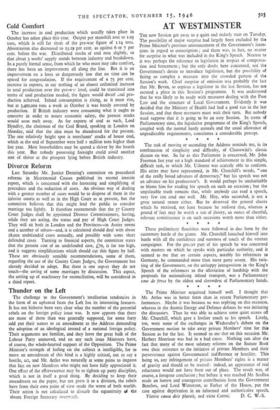AT WESTMINSTER
THE new Session got away to a quiet and orderly start on Tuesday. The possibility of major surprise had largely been excluded by the Prime Minister's previous announcement of the Government's inten- tions in regard to conscription ; and there was, in fact, no matter for surprise in what was included in the King's Speech. Nearest to it was perhaps the reference to legislation in respect of compensa- tion and betterment ; but the only doubt here concerned, not the Government's desire to introduce legislation, but the possibility of fitting so complex a measure into the crowded pattern of the Session's work. Chief surprise of omission was probably the fact that Mr. Bevan, so copious a legislator in the last Session, has not secured a place in this Session's programme. It was understood that he was likely to be ready with measures dealing with the Poor Law and the structure of Local Government. Evidently it was decided that the Ministry of Health had had a good run in the last Session, and that these measures must wait their turn. But nobody need suppose that it is going to be an easy Session. In terms of Parliamentary time, the legislative programme of the King's Speech, coupled with the normal hardy annuals and the usual allowance of unpredictable requirements, constitutes a considerable precept.
• * * * The task of moving or seconding the Address reminds me, in its combination of simplicity and difficulty, of Clausewitz's classic dictum on war. So far as this Parliament is concerned, Mr. John Freeman last year set a high standard of achievement in this simple, difficult task, to which Mr. Usborne was scarcely able to conform. His attire may have represented, in Mr. Churchill's words, " one of the really broad advances of democracy," but his speech was not an advance on his predecessor's. It would perhaps be uncharitable to blame him for reading his speech on such an occasion ; but the unpalatable truth remains that, while anybody can read a speech, very few can lead one well. Mr. Hoy, who seconded, is not a great natural orator either. But he deserved the general cheers which he received, not least because he realised that, whereas a pound of fact may be worth a ton of theory, an ounce of cheerful, relevant reminiscence is on such occasions worth more than either.
* * * * These preliminary flourishes were followed in due form by the customary battle of the giants. Mr. Churchill launched himself into battle with all the confidence and sureness of touch of the veteran campaigner. For the greater part of his speech he was concerned with matters on which he speaks with particular authority, and it seemed to me that on certain aspects, notably his references to Germany, he commanded more than mere party assent. His twit- ting of the Government, on the unhappy juxtaposition in 'he King's Speech of the references to the alleviation of hardship with the proposals for nationalising inland transport, was a Parliamentary tour de force by the oldest and shrewdest of Parliamentary hands.
* * * * The Prime Minister acquitted himself well. I thought that Mr. Attlee was in better form than in recent Parliamentary per- formances. Maybe it was because ne was replying on this occasion, whereas in the Atomic Energy and Defence debates he was initiating the discussion. Thus he was able to achieve some quiet scores off Mr. Churchill, which gave a livelier touch to his speech. Lively, too, were some of the exchanges in Wednesday's debate on the Government motion to take away private Members' time for this Session as for the last. It seemed to me that on this occasion Mr. Herbert Morrison was bad in a bad cause. Nothing can alter the fact that many of the most salutary reforms on the Statute Book owe their existence to the initiative of private Members and their perseverance against Governmental indifference or hostility. This being so, any infringement of private Members' rights is a matter of gravity and should so be treated: indeed, an appearance of real reluctance would not have been out of place. The result was, of course, a foregone conclusion ; but before it was reached Mr. Scollan made an honest and courageous contribution from the Government Benches, and Lord Winterton, as Father of the House, put the case against deprivation in an informed and authoritative speech.
Victrix causa deis placuit, sed victa Catoni. D. C. W.-S.


































 Previous page
Previous page